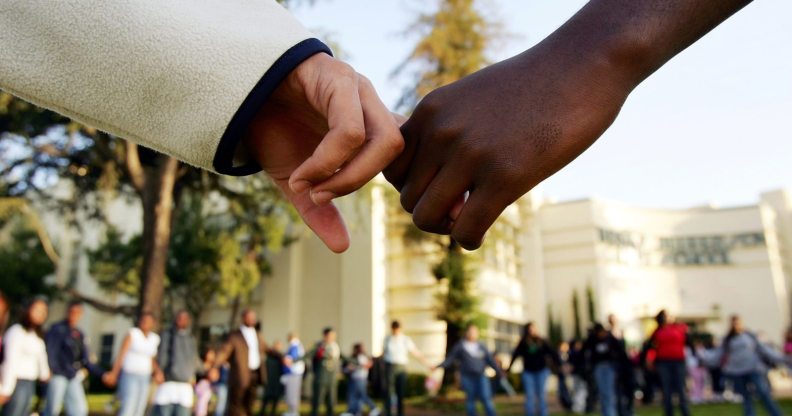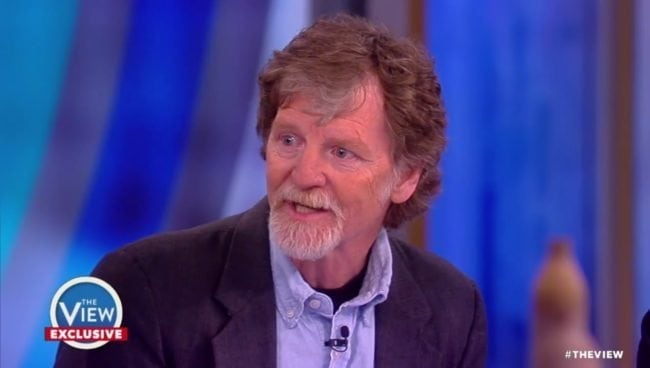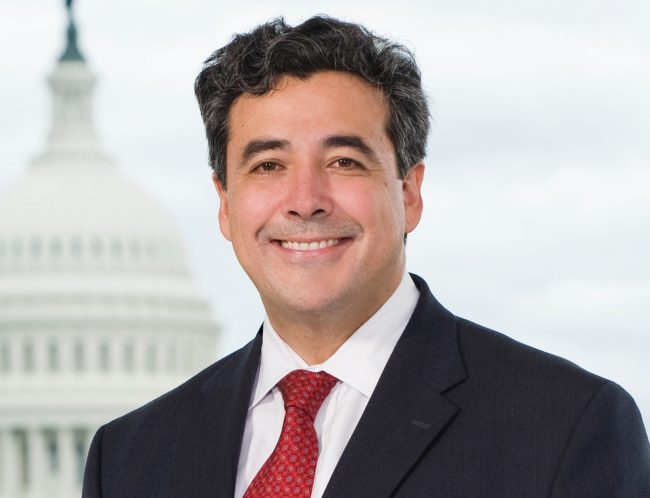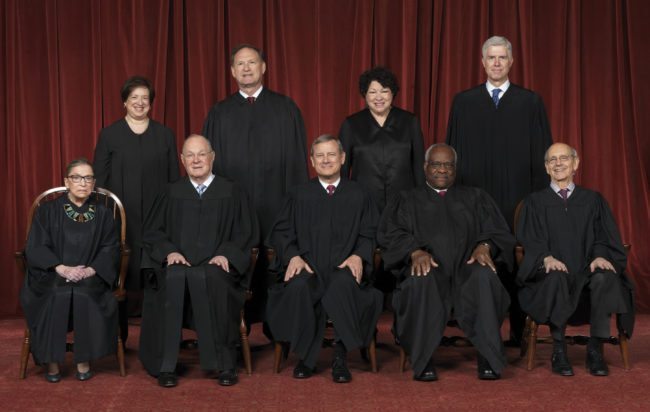Americans support ‘freedom’ to discriminate against gay and interracial couples

LOS ANGELES, CA – APRIL 21: Students pray in the aftermath of two apparent racially motivated student brawls at Thomas Jefferson High School April 21, 2005 in Los Angeles, California. A number of students suffered injuries this week while fleeing from a lunch period brawl involving about 200 Latino and African-American students, the second racially charged incident in less than a week. Stepped-up school police and Los Angeles police presence, strict regulation of clothing styles that could be associated with gangs, and a tightened school bell schedule that leaves little time to linger between classes are in effect to curb the violence. (Photo by David McNew/Getty Images)
A majority of Americans favour the ‘freedom’ for self-employed businesspeople to discriminate against both gay and interracial couples, a new study suggests.
As the US Supreme Court considers whether businesses should have the freedom to discriminate against gay couples, researchers at Indiana University Bloomington carried out a detailed study on the issue.
The study, published in the journal Science Advances, found a majority of Americans favour the right to refuse service to gay couples when a specific scenario is proposed.
A representative sample of over 2,000 people were asked to respond to hypothetical scenarios in which a photographer refused to take wedding pictures.
In variants of the survey, the photographer was self-employed or worked for a chain business, the couple was same-sex or interracial, and the reason for denying service was religious or nonreligious.
In response, 53 percent of Americans said that they supported the legal right to refuse service to gay couples, while a sizeable minority – 39 percent – agreed that the same legal right should be extended to people with objections to interracial couples.
But the study also found that people were twice as likely to support discrimination carried out by a self-employed businessperson, compared to agreeing with the owners of a larger business raising objections.
More than 50 years on from the Civil Rights Act outlawing discrimination based on race, over half said a self-employed photographer should be able to refuse service to an interracial couple.

Lead researcher Brian Powell, the James H. Rudy Professor of Sociology in the College of Arts and Sciences, said: “Race is a protected category, and despite that, many people say you can deny service.”
While 61 percent of respondents said a self-employed photographer could deny service to a same-sex couple or interracial couple, only 31 percent said a corporation could deny service
And despite the reliance on appeals to religion in court, people who support denying service don’t necessarily see it as a matter of religious freedom.
They are just as likely to support a business that denies service for reasons unrelated to religion as one that does so because of religious beliefs.

Powell said: “The finding challenges the idea that denial of service to same-sex couples is all about religious freedom.
“People may oppose same-sex marriage because of their beliefs, but their views about denial of service have nothing to do with whether the denial is for religious
The US Supreme Court recently heard oral arguments in the case of a religious baker, represented by an evangelical law firm seeking to undermine state-level LGBT discrimination protections.
Jack Phillips of Colorado’s Masterpiece Cakeshop launched a legal challenge to Colorado’s anti-discrimination laws after refusing to serve gay couple David Mullins and Charlie Craig.

The baker refused to make a cake for the couple after he found out they were celebrating their wedding
Mr Phillips claims that Jesus Christ would discriminate against gay people, and continues to insist his religion requires discrimination against gay people.
LGBT campaigners say that if the court sides with Mr Phillips, the case threatens to blow a hole in decades of civil rights laws and anti-discrimination protections across the US.
As the Supreme Court heard the case, Solicitor General of the United States Noel Francisco delivered oral arguments as part of the baker’s defence on behalf of the Trump administration.
Appearing before the court, Francisco likened the gay wedding to the KKK.

He said: “This case raises an important issue for a small group of individuals; namely, whether the state may compel business owners, including professional artists, to engage in speech in connection with an expressive event like a marriage celebration to which they’re deeply opposed.”
He added: “Is the thing that’s being regulated something we call protected speech? I think the problem for my friends on the other side is that they think the question doesn’t even matter. So they would compel an African American sculptor to sculpt a cross for a Klan service.”
The Trump official claimed it was “a narrow category of services that do cross the threshold into protected speech”.
Incredibly, Francisco appeared to answer in the affirmative when Justice Kennedy asked if the baker could “put a sign in his window [saying] ‘we do not bake cakes for gay weddings”.
Francisco said: “Your Honor, I think that he could say he does not make custom-made wedding cakes for gay weddings, but most cakes would not cross that threshold.”
Asked if the argument was an “affront to the gay community”, Francisco added: “I agree that there are dignity interests at stake here, and I would not minimize the dignity interests to [the gay couple] one bit, but there are dignity interests on the other side here too.”

The Supreme Court justices
Justice Sotomayor latched on to the claim.
She said: “We live in a society with competing beliefs, and all of our cases have always said where LGBT people have been humiliated, disrespected, treated uncivilly.
“The briefs are filled with situations that the gay couple who was left on the side of the highway on a rainy night, people who have been denied medical treatment or whose children have been denied medical treatment because the doctor didn’t believe in same-sex parenthood, et cetera.
“We’ve always said in our public accommodations law we can’t change your private beliefs, we can’t compel you to like these people, we can’t compel you to bring them into your home, but if you want to be a part of our community, of our civic community, there’s certain behaviour, conduct you can’t engage in.
“And that includes not selling products that you sell to everyone else to people simply because of their either race, religion, national origin, gender, and in this case sexual orientation.
“So we can’t legislate civility and rudeness, but we can and have permitted it as a compelling state interest legislating behaviour.”
The Trump official responded: “We don’t think you can force a speaker to join the parade.
“Because when you force a speaker to both engage in speech and contribute that speech to an expressive event that they disagree with, you fundamentally transform the nature of their message from one that they want to say to one that they don’t want to say.”
Elsewhere, Supreme Court Justice Kagan asked whether any extension of rights for “artistic expression” could be used more widely to license discrimination.
She asked: “How do you draw a line? How do you decide, oh, of course, the chef and the baker are on one side, and the florist is on that side, the chef, the baker, the florist, versus the hairstylist or the makeup artist?
“I mean, where would you put a tailor, a tailor who makes a wonderful suit of clothes? Where does that come in? The baker is engaged in speech, but the chef is not engaged in speech?”
Justice Kagan also asked whether the hypothetical exemptions from anti-discrimination laws would apply to people who object to interracial or interreligious marriage on religious grounds.
The justices also asked whether the arguments for discrimination against gay couples would also “trump public accommodation laws against
discrimination protecting customers [based on] race”
Despite the rigorous grilling from the liberal justices, experts say that the court’s conservative majority appeared sympathetic to the baker’s case, raising concerns from LGBT rights activists.
A ruling is due later this year.

